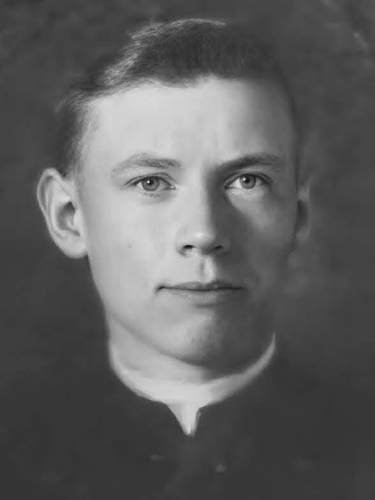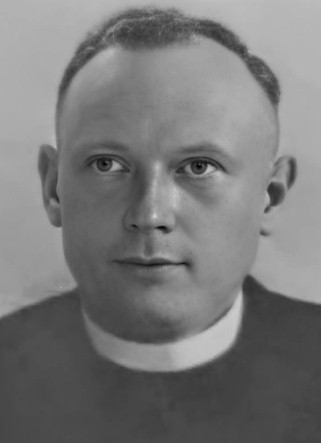|
Father Bartłomiej Stefan
Ceptowski's testimonial
During the
time spent in the Sachsenhausen concentration camp, father Karol Wajszczuk
demonstrated many noble deeds. One of those deeds was described by father
Bartłomiej
Stefan Ceptowski:
 "Here
is another incident showing the heroic side of father Karol Wajszczuk,
parish priest of Drelów in the Podlasie diocese. After a horrible
quarantine "hüpfen rollen" and other such murderous activities,
in the first days of August 1940, in the Sachsenhausen camp, we were sent to
camp work, according to the schedule set by the head of the block, a
degenerate. I was assigned to work in one of the worst kommandos in the camp,
the so-called "Kanallkommando". One had to walk to work, singing a
marching song, in a quick time, four kilometres each way. The way to work
and back, done twice a day, added to 16 kilometres daily. The work consisted
of unloading freight ships, loaded with coke, coal, brick and cement. At
that time, we were unloading coal, which was being brought from the ships on
wheelbarrows over a narrow, easily moving plank. Some 100 metres from the
bank, a high heap of this coal was formed, by climbing a plank with a full
wheelbarrow. This work exceeded my strength and, above that, my organism was
very exhausted by the murderous quarantine. On the day I am recalling now, I
wheeled three barrows of coal up the heap but all strength leaves me as I am
in the middle of the plank with the fourth one. I cry for help, nobody
comes, my fainting hands let out the loaded wheelbarrow and it falls into
the water. The Kapo of our kommando tells me to jump into the water and get
back the wheelbarrow, I look around for help, my brothers, the other Poles
are helpless and frightened and the faces of the Germans are merciless.
Somebody pushed me and there I am, in the water, sentenced to death.
Surprisingly, the SS Kommando führer himself ordered that I should be taken
out of the water. I was still fainting when I was moved to the block at noon.
The head of the block, seeing the state I was in, did not send me out to
work in the afternoon and left me in the block. Over the night, my organism
gathered strength enough to stand up for the morning assembly but it was
difficult for me to walk to work. The head of the block drives me off to the
kommando. My explanations, that I am without strength, are in vain. The camp
only has place for the healthy and for the dead, there are no weak and ill.
When you will be finished, you will be free from work. As a sign of his good
heart, the head of the block gives his brother a piece of rope to hang
himself. I know that, if I walk to work, I shall definitely die, if not in
the way, then surely the Kapo will not forgive me for letting out that
wheelbarrow into the water. There is no way out. I recommend myself to God
and I stand in the line for the "Kanallkommando". At that moment,
father Karol Wajszczuk comes up to the head of the block. He is a Podlasie
priest – of my diocese – aged 53, almost unknown to me, for I am only 30
years old; we became attached to one another in the camp. He asks the head
of the block to place him instead of me in this kommando. ”He is already
unfit for this work,” says the head of the block. “He is my countryman,
I am older but still strong and he is half dead, anyway, he is still young,
why should we waste his life, I am less fit to be spared” answers the
heroic Polish priest. On hearing this all, I cry loudly that I do not agree
to this substitution, I shall go myself, I will not let him go in my place.
Here, I must explain that those who walked wore special clogs with only the
fingers covered. The head of the block, on hearing our quarrel, explained
that it did not matter to him who would go. I had the shoes on, so I
started walking. At this moment, father Wajszczuk immediately catches me,
turns me over, I do not have the strength to defend myself. He takes off my
shoes and puts them on. The shoes turn out to be too small, the head of the
block urges on, so father Wajszczuk, limping because of the small shoes,
runs after the kommando, which has already left. "Here
is another incident showing the heroic side of father Karol Wajszczuk,
parish priest of Drelów in the Podlasie diocese. After a horrible
quarantine "hüpfen rollen" and other such murderous activities,
in the first days of August 1940, in the Sachsenhausen camp, we were sent to
camp work, according to the schedule set by the head of the block, a
degenerate. I was assigned to work in one of the worst kommandos in the camp,
the so-called "Kanallkommando". One had to walk to work, singing a
marching song, in a quick time, four kilometres each way. The way to work
and back, done twice a day, added to 16 kilometres daily. The work consisted
of unloading freight ships, loaded with coke, coal, brick and cement. At
that time, we were unloading coal, which was being brought from the ships on
wheelbarrows over a narrow, easily moving plank. Some 100 metres from the
bank, a high heap of this coal was formed, by climbing a plank with a full
wheelbarrow. This work exceeded my strength and, above that, my organism was
very exhausted by the murderous quarantine. On the day I am recalling now, I
wheeled three barrows of coal up the heap but all strength leaves me as I am
in the middle of the plank with the fourth one. I cry for help, nobody
comes, my fainting hands let out the loaded wheelbarrow and it falls into
the water. The Kapo of our kommando tells me to jump into the water and get
back the wheelbarrow, I look around for help, my brothers, the other Poles
are helpless and frightened and the faces of the Germans are merciless.
Somebody pushed me and there I am, in the water, sentenced to death.
Surprisingly, the SS Kommando führer himself ordered that I should be taken
out of the water. I was still fainting when I was moved to the block at noon.
The head of the block, seeing the state I was in, did not send me out to
work in the afternoon and left me in the block. Over the night, my organism
gathered strength enough to stand up for the morning assembly but it was
difficult for me to walk to work. The head of the block drives me off to the
kommando. My explanations, that I am without strength, are in vain. The camp
only has place for the healthy and for the dead, there are no weak and ill.
When you will be finished, you will be free from work. As a sign of his good
heart, the head of the block gives his brother a piece of rope to hang
himself. I know that, if I walk to work, I shall definitely die, if not in
the way, then surely the Kapo will not forgive me for letting out that
wheelbarrow into the water. There is no way out. I recommend myself to God
and I stand in the line for the "Kanallkommando". At that moment,
father Karol Wajszczuk comes up to the head of the block. He is a Podlasie
priest – of my diocese – aged 53, almost unknown to me, for I am only 30
years old; we became attached to one another in the camp. He asks the head
of the block to place him instead of me in this kommando. ”He is already
unfit for this work,” says the head of the block. “He is my countryman,
I am older but still strong and he is half dead, anyway, he is still young,
why should we waste his life, I am less fit to be spared” answers the
heroic Polish priest. On hearing this all, I cry loudly that I do not agree
to this substitution, I shall go myself, I will not let him go in my place.
Here, I must explain that those who walked wore special clogs with only the
fingers covered. The head of the block, on hearing our quarrel, explained
that it did not matter to him who would go. I had the shoes on, so I
started walking. At this moment, father Wajszczuk immediately catches me,
turns me over, I do not have the strength to defend myself. He takes off my
shoes and puts them on. The shoes turn out to be too small, the head of the
block urges on, so father Wajszczuk, limping because of the small shoes,
runs after the kommando, which has already left.
 He went, saving me from
death, but fell in death’s trap himself, for he could not move properly
because of the tight shoes. They beat him strongly, for he had injured his
feet during work. He was afterwards dismissed from this work, as he was
unable to do it. I was no called for anymore and not searched for. As a
result of the sores on his feet, father Wajszczuk got phlegmon and, as an
invalid, unable to work, he was later sent to a gas chamber, from the camp
in Dachau, in 1942. Honour to the memory of the priest and hero. Lord, have
mercy on him!” He went, saving me from
death, but fell in death’s trap himself, for he could not move properly
because of the tight shoes. They beat him strongly, for he had injured his
feet during work. He was afterwards dismissed from this work, as he was
unable to do it. I was no called for anymore and not searched for. As a
result of the sores on his feet, father Wajszczuk got phlegmon and, as an
invalid, unable to work, he was later sent to a gas chamber, from the camp
in Dachau, in 1942. Honour to the memory of the priest and hero. Lord, have
mercy on him!”
On
the 4th of May 1955, father Stefan Ceptowski wrote about the
“martyr-priest, father Karol Wajszczuk” in an article in the “Słowo
Powszechne”. After that, he also told the story of father Karol
sacrificing his life for the life of another priest to the parish folk in
the Drelów parish church, in the presence of Bishop Jan Mazur.
|